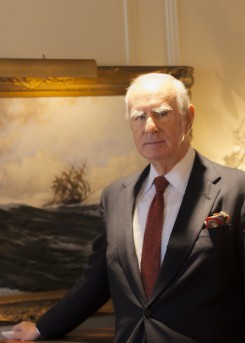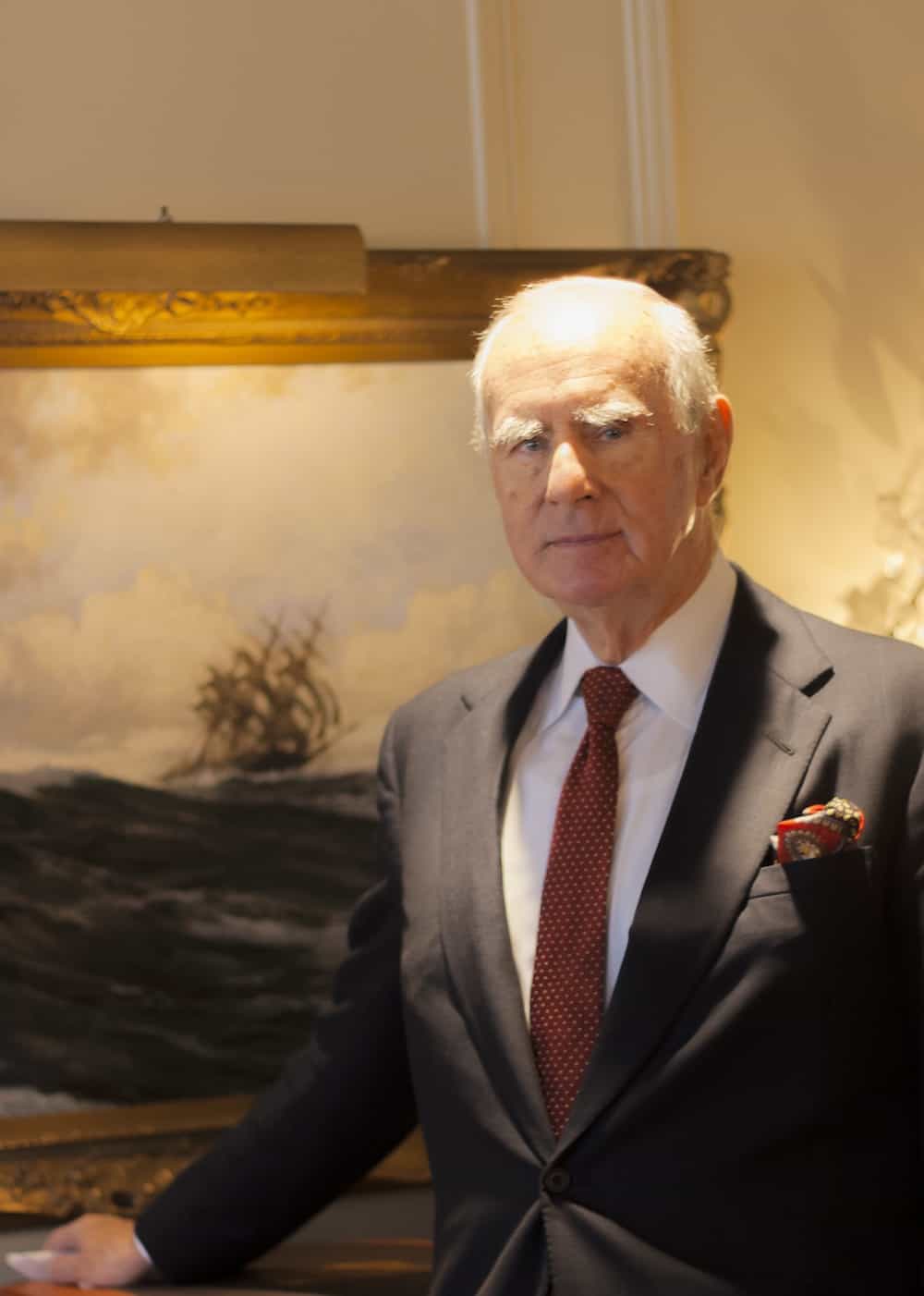This is the first in a multi-week series of profiles introducing donors who have given more than $25 million to the University of Toronto’s “Boundless” Campaign.
The Honourable Henry Newton Rowell “Hal” Jackman welcomes me into his vast, elegant 10th floor office. It is lavishly and tastefully appointed, with gorgeous landscape art; hardwood floors; and rich, intricate Persian rugs. The former Lieutenant Governor of Ontario is as well known for his philanthropy as for his success in business. A patron of the arts and humanities, as well as a U of T alumnus, Jackman has given more than $40 million to the university since 1998.

AARON TAN/THE VARSITY
“I’m a Torontonian, born and brought up here. I’m a graduate of U of T, from Arts and then from Law. Both my parents are graduates of U of T. Where else would I give? It’s the natural place for me to be interested in, and I think the best university in the country,” he says. Thirty million dollars of his donation went to the Jackman Humanities Institute and the Jackman Humanities Building, $11 million to the law school, $2 million to Victoria College for its Vic One program, and $500,000 to the Centre for Medieval Studies’ 2012 fundraising effort for the Dictionary of Old English, among others.
“The humanities are broadening to the mind, whereas a lot of professional courses tend to be narrowing. You go into dentistry, and what do you learn? You learn about teeth! I think the humanities are deserving of support,” says Jackman. His wife, Maruja Jackman, was a professor in the humanities, and all five of his children have post-graduate degrees in the humanities.
Jackman credits his upbringing as the foundation of his philanthropic spirit. Born in 1932 to Henry Jackman, Member of Parliament, and Mary Rowell Jackman, Jackman says that his family did not believe in frivolous spending. “My mother and father were very generous. We came from what we would call a Methodist background, where we don’t believe in ostentatious display of wealth.” He gets more of a kick, he says, out of contributing to the university than buying expensive properties or luxury goods. “I don’t have a yacht, or a big house in Florida, or the south of France, or anything like that. I guess it’s tradition,” he says.
As far as U of T’s policies, Jackman says that he does not know enough to comment on specific ways in which the university can improve. He did say that he thinks the university should focus its resources on professors at the entry level, rather than going after established, senior professors from other institutions. “I have the opinion that if you’re building for longer term, you’re better to spend the money at the lower levels, on entry-level positions, which are very good for post-docs or assistant professors. Because if they’re really really good, they’ll get acclimatized, make friends, meet people, get married, have children, have a house. They build themselves into the community, and then it takes a hell of a lot to get them to leave.”
Despite holding this opinion, Jackman says that he is rather hands-off when it comes to the specifics of where his donations go, leaving the details up to the university. “Because the university needs the money, the university has to cut donors a lot of slack for a lot of them to sound off. I didn’t try to dictate what they should do. I talked about the general area I wanted to donate to, I agreed it was for the humanities, but I’m not saying whether we need more professors, or we need more post-docs, or scholarship money.”
Weighing in on tuition fees, Jackman says that he thinks that, aside from government subsidies, tuition should not be free. Someone has to pay for it, he says, and the cost of university should be borne by those who benefit from it — the students.
He seems to hold a positive opinion of millennials in general. Jackman claims that students coming out of U of T today are of much better quality than in his time as a student. “Maybe the sense of entitlement has gone up, but certainly the students are very good. I’m the visitor at Massey College, and I see very bright, very good kids. I think they’re exceptionally gifted people. Certainly the calibre and the quality of our graduates now compared to my day is way, way up.” He credits stricter admission standards as the main reason for this improvement.
Looking back on his experience as an undergraduate, Jackman admits that he was not a diligent student in those years, saying that he appreciates the university more in retrospect. “I remember the hijinks more than I do the academic studies as an undergraduate. I did an awful lot of theatre. Robert Gill was the head of Hart House Theatre in those days, and I spent a lot of time in the plays there. I probably spent more time in the theatre than I did in my studies,” he says.
On the topic of those hijinks, he has more than a couple of stories to tell. “We did all kinds of crazy things. We did what we call panty raids, our ‘50s expression, and all this kind of stuff. I don’t know whether that was very constructive, but it filled in the time.” Smiling, he recalls taking the sheets off the bed of a senior tutor with a few friends, and hoisting them up on the flagpole over Victoria College. “We were called in before the dean, and the dean said: ‘Why would two young fellows like you, intelligent, rational people, do a thing like that?’ I looked at my friend, and he looked at me. We both shrugged our shoulders, and mumbled ‘well, if you have to ask, you wouldn’t understand.’” Things changed in law school, he says, where the disciplinary standards and work load increased.
“My best educational experience was at the law school,” says Jackman. Even today, he occasionally attends law and business lectures at the university. He says that he loves to watch the seasons change on campus on his walk from his south Rosedale home to work in the financial district. “I certainly enjoyed the University of Toronto, so I owe something to it, I guess. You have to give back if you can,” he concludes.


